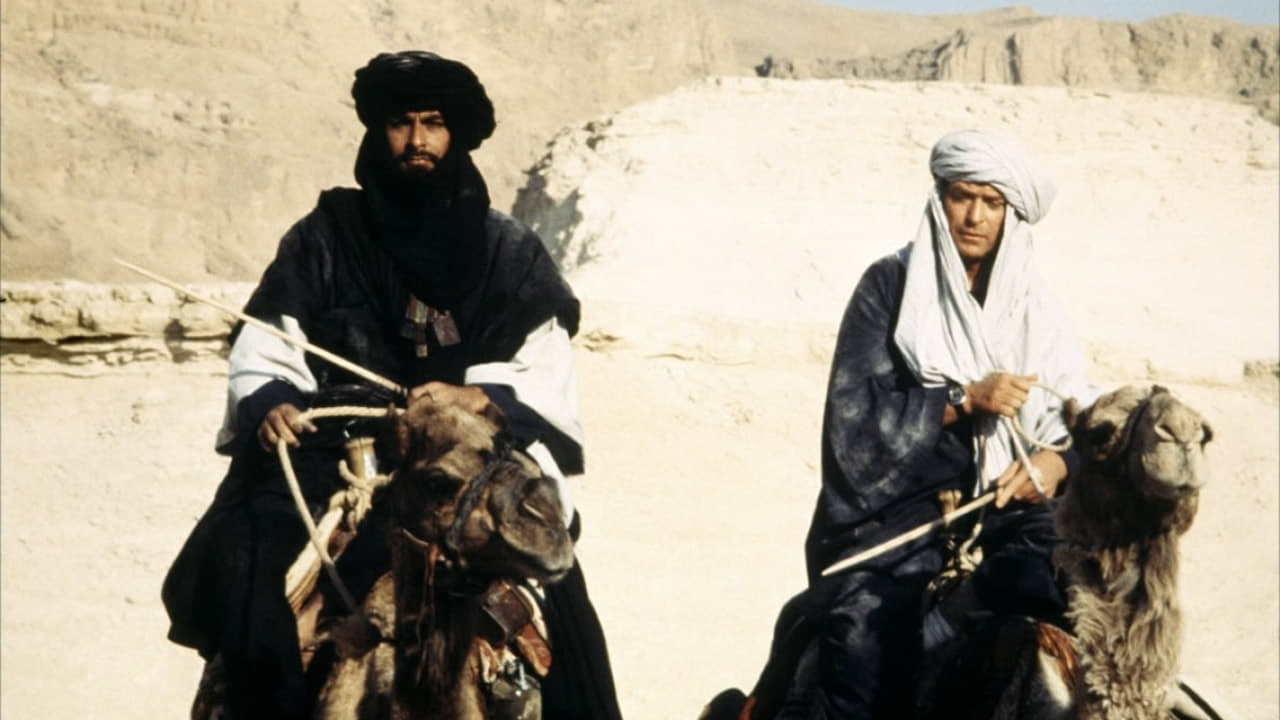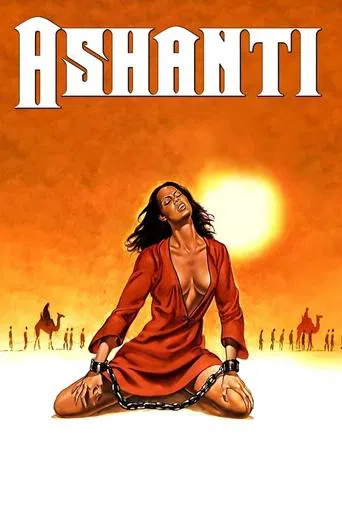

There have been far too few mainstream films set in post-colonial Africa, and the ones that have are a mixed bunch. This one, with its altruistic pretensions to expose slavery in the 1970s, shows the best and worst values of Africa, which turn out not to be too different to the values of humanity as a whole. It also has shortcomings, given the undue influence of western pre-conceptions of Africans and, especially, Arabs.Dr Anansa Linderby, the beautiful African-American wife of the English doctor David Linderby, is captured by Arab slave-traders, along with a teenage Sanufu girl and a young boy. The lead slave-trader, Suleiman, is every bit the stage Arab, with his flowery and sometimes humorous rhetoric, and gestures to match - which would not be out of place on "Carry On Follow that Camel" but are not up the standard this film deserves. Peter Ustinov of course had more than enough skills to address some of the shortcomings of the script, and he rescued what could otherwise have been a woeful one-dimensional character.Continuing the stereotypical theme, all three of Suleiman's Arab employees are unintelligent and one has paedophilic tendencies towards the boy, which thankfully are not portrayed on the screen.One of David's first ports of call is the local police officer, a stereotypical pompous and incompetent African bureaucrat. David then meets two stereotypical white ex-pats, an Englishman (Walker, played by Rex Harrison) and an American (Sandell, played by William Holden). Sandell is a mercenary with "conventional" views on mixed-race relationships, who initially refuses to help unless David provides payment up front. Won over by David's love for Anansa, and conscious of his own inability to find love, he agrees to take David up in his helicopter to help search for Anansa. They find Suleiman and his captives crossing the border and are unable to pursue them into the neighbouring territory - as a result of Sandell's hesitation and David's lack of experience with firearms, his helicopter is shot down but David survives.We then see David introduced to Malik (Kabir Bedi), an African who has lost his family to Suleiman and is now only driven by vengeance. They find the Sanufu girl with a group of Tuareg and know they are on the right track to find Suleiman.In one of the most heart-rending scenes they kill a party of slave traders only to find that it was not Suleiman's group, and have no choice but to send their captives to the Tuaregs they met earlier.Later on we discover that the young boy who had been raped is a witch doctor and, in an excellent scene with supernatural overtones, he uses his knowledge to kill one of Suleiman's henchmen. Anansa on her part - and despite the scepticism of the boy - manages to engineer the demise of Suleiman's two other employees.By this time Suleiman and his slaves are within days of reaching the slave market.Suleiman, now in no doubt that Anansa is "trouble", attempts to sell her to an obscenely wealthy Arab prince (Omar Sharif) who is corrupt but intelligent. On discovering that Anansa is an American working for the U.N., the prince rather unwisely decides to carry on with the bargaining without considering the consequences. The scene where the two men haggle is one of the best in the film.At the slave market, the young boy is sold to a middle-aged German paedophile, and we are left to guess whether the boy will still be considered "wunderbar" when his owner is on the receiving end of his witch-doctoring skills.David and Malik finally confront Suleiman and there is a bitter-sweet ending from Malik's point of view.Ultimately, David and Anansa are re-united, and Malik, whose life is in ruins, can console himself with having seen the task he set himself completed.The overall plot of the film is excellent but it loses marks for its stereotypical portrayal of nearly all the leading characters. Credit must go to all the leading actors for addressing many of the shortcomings of the scripting.
... View MoreMy rating considers the subject matter, modern-day slavery (!), some good photography ( captives walking through Lawrence's desert, a couple of good cameos), and gives Caine, and the director, a pass for execution. I agree that there could have been a much better musical score, however, this film tickled my imagination when I first saw it in 1980; not just about how it could have been a better film, but simply by the fact that slavery, and a slave trade, continues to exist: a fact later confirmed and documented by activists as recently as 2001. As this film was originally released in 1979, I wonder how much of a budget the film would have had it been made more recently, in light of current knowledge about this phenomenon. I have ordered this film to be included in my collection. Some films' impact is only realized over time, perhaps with repeat viewings, or some time after viewing to consider their whole; some have their greatest impact upon first or second viewing, with subsequent consideration or viewing either reducing said impact, or by that impact's simply not continuing to swell. This is a film that, while it didn't continue to grow in significance for me, neither did its significance decline. It could certainly have been better, and it's unfortunate that Michael Caine, an actor whose work I largely admire, wasn't happy to have worked on this film, but I do believe that it is much better than many other b- films to be found.
... View MoreThere seem to have been any number of films like this released during the 70's. And the fact that I cannot recollect the title to a single one of them off-hand is a measure of their impact. These are what novelists would call 'pot-boilers'. They are scarcely more than a vehicle for keeping movie-stars in the public eye.We have Micheal Caine, Peter Ustinov, Omar Sharif, Rex Harrison and William Holden; more than enough names to get bums on cinema seats. Every taste in hero is catered for. Though one suspects that most of the audience still went away disappointed.Their talents are simply thrown away, and I wonder that stars with so much money and such reputation can be yet so desperate or lacking in good sense. This sort of movie hardly adds gilding to a CV. Sometimes maybe actors should choose their director instead of the other way round.It was pretty obvious that it would be crap even from the outset. That ludicrously mismatched jaunty-jazz theme music, which also percolated up every time some incidental noise is needed, had all the atmospheric conviction of elevator Muzak. Who imagined employing a jazz band when a scene depicted the steamy jungles of central Africa, or the endless Sahara with camels and palms as a backdrop? Definitely a serious goof-ball. Ennio Morricone would have known what to do; and his results would have oozed enough atmosphere and tension to raise my rating a good two points. This director should have taken the trouble to watch 'Lawrence of Arabia', or even Sergio Leone's westerns; he might have learnt a few things. But then again, probably he wouldn't.Alfred Hitchcock played the disappearing wife theme to good effect in his film 'Frantic'. It was later remade with equal panache staring Harrison Ford. In each case the confusion surrounding her loss and the tension of the chase was tangible. Here, when Michael Caine might be otherwise compelled to employ a little brain and bravado, Rex Harrison kept popping-up out of no-where like some wily old genii, to put him back on track whenever the narrative stumbled. At least the photography was rather good, with excellent use of the often beautiful environment. But then the dumb music must pipe-up and blow to atoms what little ambiance this created.Action scenes were also contrived and stilted, with such ineptly choreographed fight sequences that they might have been staged in a first-year drama class. And, of course, the players must fight to a jazz accompaniment - as you do.And that's about as much comment as this item deserves. Except to say that the script was pretty wretched as well.Stick with your hobby on this one. Even if it contained your favourite movie-stars, you're sure to be disappointed too.
... View MoreASHANTI is a somewhat typical movie from the late 70s/early 80s starring Michael Caine . It's certainly watchable in an undemanding way but no more than that but neither is it bad enough to be virtually disowned by its star .The story itself is intriguing an Afro-American doctor working for the UN is kidnapped by slave traders and it's up to her English born husband to track down the kidnapped woman . I guess the movie could have concerned itself more as to dispelling or building myths about the present day slave trade but it's not that type of movie and rightly concentrates on action and adventure One can't help thinking that maybe Caine's dislike of the movie is down to the fact that he's playing a hero and as everyone knows heroes are by their very nature boring . Undoubtedly Malik played by Indian actor Kabir Bedi is the most interesting character while Peter Ustinov as Sulimen gets by far the best lines and scenes like " A father , a father , a father " . Very frequently Caine gives the impression that as soon as the movie is finished and the cheque is in the bank he'll be firing his agent ASHANTI is a movie that demands very little from and offers little to its audience except to sit back and be enthralled . Film buffs might complain that this is a poor movie considering it was directed by the legendary Richard Fleischer , well maybe but I think the only thing the director can be criticised for is casting an obviously unwell William Holden in a needless cameo
... View More